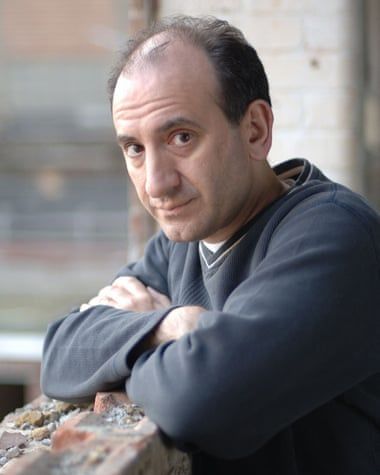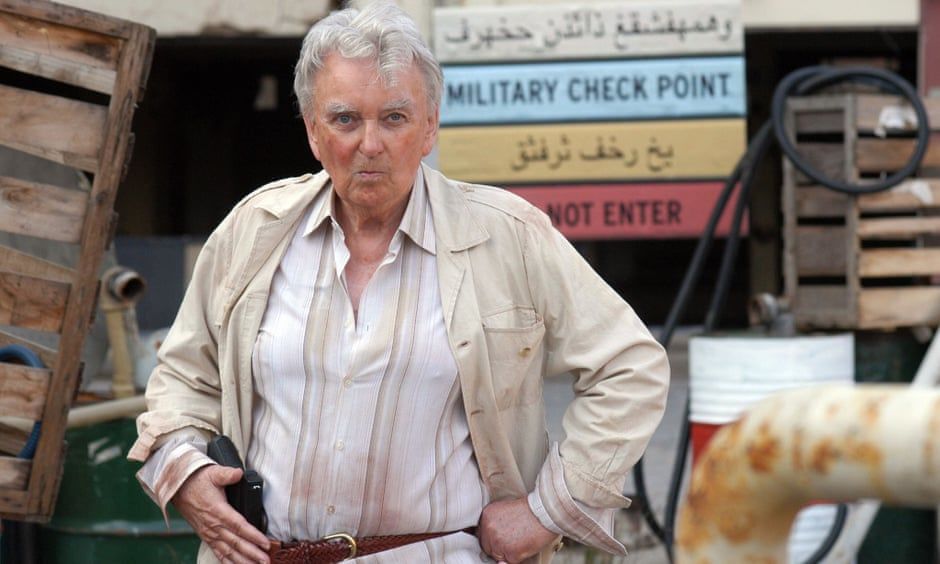From a guilt-ridden Tony Blair to plastic surgery for kids, Armando Iannucci’s series deftly spoofed our love of nostalgic TV. 15 years on it’s still brilliant – and a true hidden gem
“The airwaves were infected with them,” says Armando Iannucci of early 00s celebrity talking-head shows such as I Love the 80s. “Television was going through an identity crisis of looking back and eating itself and it was obsessed with celebrities. The history of the Nazi party would have to have someone from the equivalent of Love Island on it.”
The comedy writer’s response was to create, alongside co-writers Roger Drew and Will Smith, the 2006 series Time Trumpet, a retrospective documentary set in 2031 looking back on the first 30 years of the 21st century, with cultural commentators including Stewart Lee, Jo Enright, Adam Buxton and Richard Ayoade.
The fake television shows and events on which they were asked to reflect remain brilliantly ludicrous 15 years later: a CBBC show called Spicey Slicey, where youngsters went under the knife live on air; Charlotte Church vomiting herself inside out; Sebastian Coe murdering Justin Lee Collins after he revealed the London 2012 Olympics were a hoax; and “the most popular TV programme of all time”, Rape an Ape. Yet, despite the huge talents involved and its status as a unique and innovative programme, Time Trumpet is the definition of a cult show. It exists only on DVD and YouTube – the BBC doesn’t even have it on iPlayer.
 Armando Iannucci.
Armando Iannucci.
This is slightly incongruous, considering the future-facing themes of the series. The writing team met with scientists and experts to discuss what life might look like in 25 years, scouring ad agencies for talent (“Advertising is full of people who really want to go into comedy,” says Iannucci). This brought them to the future film director Ben Wheatley, as well as another rising star, Gareth Edwards. The latter – later the director of Rogue One: A Star Wars Story – created effects for scenes such as Tesco invading Denmark.
As for the script, it as a moveable feast. “I didn’t know any of the things I was going to be doing,” recalls Stewart Lee of making the series. “Armando would ask questions and we improvised around the answers.” Others had scripted parts, but capturing spontaneity was key. “Sometimes I dropped people in it,” says Iannucci. “But I tried not to think too hard, because I wanted to be genuinely surprised by what they might come up with, like Adam Buxton doing a travelogue on the best places in the world to have a wank. Now, that’s not something I ever woke up and thought about, but if he wanted to bring it to the table then he was more than welcome.”
Actors were also drafted in to play celebrities in 2031, reflecting on their own lives, be it Tom Cruise proclaiming he is “pound for pound the strongest man on this planet” or Ant and Dec being put in charge of an inquiry into Britain’s binge-drinking epidemic. “It made us laugh, the idea of David Beckham channel surfing and coming across Time Trumpet,” reflects Will Smith. “And then being like: ‘Oh, there’s a man pretending to be me as a centaur with a vagina stitched into his arm.’ And just how baffled he’d be as to why this was happening.”
Charlotte Church didn’t see Time Trumpet at broadcast. “I would have been totally bemused and maybe found it a bit offensive,” she says. “But now I don’t find it offensive in the slightest. I think it’s comedy genius. Sure, it was based on a twisted tabloid press stereotype of my character, but it’s odd, extreme and hilarious.”
 An actor playing Tony Blair in Iraq on Time Trumpet.
An actor playing Tony Blair in Iraq on Time Trumpet.
The show also married extreme daftness with political bite. Tony Blair, in particular, is a constant target. “The war on terror is very much a subtext,” says Roger Drew. Smith adds: “The appalling mistake of Iraq was definitely in the air, so we had Blair wandering around Baghdad in a stupor of guilt.” A scene in which Blair is assassinated was cut from the DVD home release.
The format allowed them to go to extremes that a show more rooted in reality couldn’t. “You can say terrible things, but nobody can sue you, because it’s all in the future,” laughs Iannucci. “Because we’re operating in the abstract and saying: ‘We’re making this up, this is clearly spurious,’ it allows you the freedom to approach subjects that are a bit more sensitive. It allows you to go further and slip in more impactful stuff if what’s around it is a bit more playful and speculative.”
Fifteen years on, what did Time Trumpet get right? Well, Jamie Oliver didn’t clone himself to sell his own brand of meat. Nor did Vernon Kay continue to grow in height until he had to be “destroyed”, but some events aligned. “One thing Time Trumpet definitely got right is predicting David Cameron was going to do something catastrophically terrible with consequences that would echo for years,” says Smith. “Which does tally quite neatly with his legacy.”
As for the legacy of Time Trumpet, Drew describes it as “the one that got away”. Lee hasn’t seen it since it aired. “I’ve got a DVD somewhere,” he says. “I’m waiting for them to all come down to 50p on Amazon and then I can sell them on tour for £5.99. But the problem with you writing this is that now they’ll go up in value.”
Even so, might there be potential for a future return? “Maybe as a one-off special,” says Iannucci. “I’m always interested in playing with what we perceive to be real and what isn’t. The problem now is fakery has become more sinister. If anything, we’re fighting hard to identify what’s real. I’d hate to conclude that Time Trumpet is a toolkit for rightwing organisations – that’s not what I went into comedy for.”















